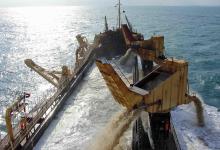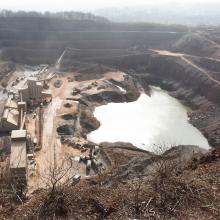Three winners of the
Mark Russell, director BMAPA, said: “Staff working in the marine aggregate industry, at wharves or on board dredgers are aware they can encounter archaeological finds during their day to day work, so the existence of a reporting protocol is vital to ensuring any items of potential heritage interest are reported. Their vigilance ensures that any finds of potential archaeological importance discovered across the UK marine aggregate industry’s operations can be reported to heritage experts so their significance can be assessed.’
Commenting on the awards, Chris Pater, head of Marine Planning at Historic England, said: “For more than a decade, the marine minerals industry has demonstrated a commitment to our nation’s heritage through their awareness and recording methods. These awards directly recognise how we can all contribute to our understanding of the past by reporting what might be found at wharves or while at sea.”
The 2015 BMAPA Annual Archaeology Award winners are:
Best Attitude at a Wharf - Burnley Wharf (
Best Attitude on a Vessel – Arco Dart (
Best Find – Underwater Swimmers’ Breathing Apparatus (Bedhampton Wharf, Tarmac) - A brass mouthpiece with twin rubber hoses manufactured by
The archaeological reporting protocol was developed by BMAPA and English Heritage to enable archaeological finds, encountered during marine aggregate operations (either on board dredgers or at the wharves), to be reported. It continues to be delivered through an implementation service provided by Wessex Archaeology, and co-funded by BMAPA and The Crown Estate. The service allows finds recovered by industry staff to be identified and assessed for their significance by heritage experts and, where necessary, for appropriate mitigation to be introduced on production licence areas to protect previously unknown sites of importance.
Since the protocol was introduced in 2005, over 380 separate reports have been filed by marine aggregate industry staff (53 in 2014/15), covering over 1,100 individual items (c.79 in 2014/15). Finds reported range from animal remains from the Palaeolithic period, through to airframe and machine gun parts from WWII aircraft.
The implementation service includes an %$Linker:
To support the practical delivery of the protocol, an awareness programme to encourage its use amongst industry staff, working on both wharves and on the dredgers themselves, continues to be funded through a partnership approach between BMAPA, The Crown Estate and Historic England. The programme involves site visits by maritime archaeologists to provide industry staff with the knowledge and confidence to identify and report items of potential archaeological interest that may be found amongst dredged cargoes, as well as the production of twice-yearly ‘Dredged Up’ newsletters.






